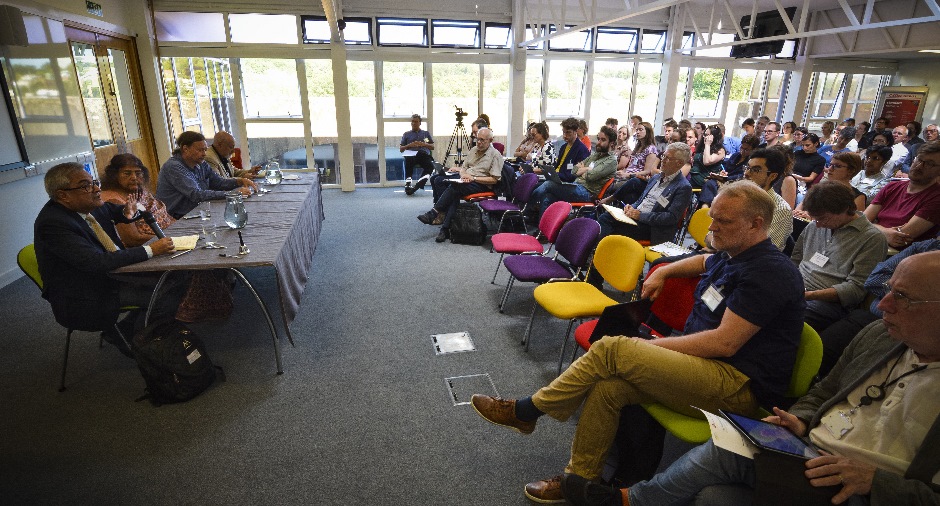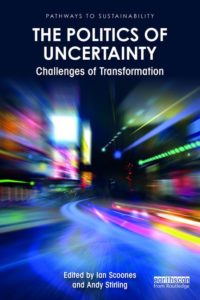
- This event has passed.
The Politics of Uncertainty: Practical Challenges for Transformative Action
3rd July 2019 @ 3:30 pm - 5th July 2019 @ 4:00 pm
 This international academic symposium, held at the Institute of Development Studies in the UK, explored the theme of uncertainty – the STEPS Centre’s theme for 2019.
This international academic symposium, held at the Institute of Development Studies in the UK, explored the theme of uncertainty – the STEPS Centre’s theme for 2019.
Book | Blog series | Podcast | Video | Background info
 Book
Book
The Politics of Uncertainty: Challenges of Transformation (Routledge, July 2020) is an Open Access book which further explores the ideas discussed at the symposium.
The book features chapters by participants, and an introduction by the editors (and symposium convenors), Ian Scoones and Andy Stirling.
Blog series
Participants in the symposium reflect on the event in a series of blog posts.
- Uncertain futures and the politics of uncertainty Richard Bronk
- Uncertain superlatives Emery Roe
- When ignorance does more than you think Emery Roe
- Solidarity, insurance, emotions and uncertainty Mark Fenton-O’Creevy
- Whose risk? Whose responsibility? The politics and financialisation of uncertainty Nick Taylor
- Embracing uncertainty: lessons from journeys and struggles Michele Nori, Rose Cairns and Nathan Oxley
- Infrastructures of the imagination: uncertainty and the politics of prefiguration Martin Mahony and Silke Beck
- Envisioning the future in the present: making sense of uncertainty Detlef Müller-Mahn
- How can NGOs feel at home with uncertainty? Irene Guijt
Podcast
![]() The STEPS Uncertainty Podcast is a series of four conversations recorded with participants after the symposium, available as a podcast to stream or download.
The STEPS Uncertainty Podcast is a series of four conversations recorded with participants after the symposium, available as a podcast to stream or download.
Episode #1: Finance & banking / insurance / governance
With Leon Wansleben (Max Planck Institute for the Study of Societies), Leigh Johnson (University of Oregon), Bernardo Rangoni (European University Institute), Ian Scoones (STEPS Centre)
Episode #2: Uncertainty in critical infrastructures / reliability / technology & innovation
With Patrick van Zwanenberg (CENIT, Argentina), Emery Roe (University of California, Berkeley), Andy Stirling (STEPS Centre)
Episode #3: Disease outbreaks / climate change / disasters
With Melissa Leach (Institute of Development Studies), Lyla Mehta (Institute of Development Studies), Mark Pelling (King’s College London), Marina Apgar (STEPS Centre)
Episode #4: Security & terrorism / migration
With Gabe Mythen (University of Liverpool), Dorte Thorsen (University of Sussex), Rose Cairns (STEPS Centre)
Video
Watch a playlist of all videos from the symposium.
[embedyt] https://www.youtube.com/embed?listType=playlist&list=PLI8qkz1i11OQNKD34R5WJzu8bhYUuoa24[/embedyt]Video clips
Watch selected clips from the symposium at the links below.
Panel contributions: ‘What is uncertainty, and why does it matter?’
![]() Silvio Funtowicz: What is uncertainty, and why does it matter?
Silvio Funtowicz: What is uncertainty, and why does it matter?
![]()
![]()
![]()
![]()
![]()
![]()
![]()
![]()
![]()
![]()
![]()
![]()
![]()
![]()
![]()
![]()
![]()
![]()
![]()
![]()
Panel contributions: ‘What happened to the Risk Society?’
![]()
![]()
![]()
![]()
![]()
![]()
![]()
![]()
![]()
![]()
![]()
![]()
![]()
![]()
![]()
![]()
![]()
![]()
![]()
![]()
![]()
![]()
![]()
![]()
![]()
![]()
![]()
![]()
![]()
![]()
Video of full sessions
![]()
![]()
![]()
![]()
![]()
![]()
![]()
![]()
![]()
![]()
![]()
![]()
![]()
![]()
![]()
![]()
![]()
![]()
![]()
![]()
![]()
![]()
![]()
![]()
![]()
![]()
![]()
![]()
![]()
![]()
About the symposium
Thinking across diverse domains – from finance, to climate, to migration, to disease, to innovation, to infrastructure, to security – this symposium will explore the diverse ways incertitude is understood and responded to (or not).
By catalysing and developing richer and more nuanced understandings of incertitude, the symposium aims to help enable more robust actions, strategies and governance for these uncertain times.
For updates, please subscribe to the STEPS Centre newsletter.


For more images from the event, see the photo gallery on Flickr.
Speakers
Plenary speakers include
- Dean Curran, University of Calgary
- Sheila Jasanoff, Harvard Kennedy School
- Silvio Funtowicz, University of Bergen
- Gabe Mythen, University of Liverpool
- Dipak Gyawali, Nepal Academy of Science and Technology
- Brian Wynne, Emeritus Professor, University of Lancaster
- Joy Zhang, University of Kent
- Silke Beck, Helmholtz Centre for Environmental Research
- Melissa Leach, Institute of Development Studies
- Lyla Mehta, Institute of Development Studies
Programme
3 July
15:00 Registration opens
16:00 PLENARY 1: What is uncertainty, and why does it matter? Sheila Jasanoff, Silvio Funtowicz, Dipak Gyawali
18:00 Refreshments + publication ‘speed launches’
19:00 Dinner
4 July
9:00 CLUSTER SESSION (parallel session, each cluster meets in different rooms) – presentations from first two themes
11:00 Tea & coffee
11:30 CLUSTER SESSION – presentations from third theme
12:30 Lunch
14:00 CLUSTER SESSION – cross-theme discussion: How is uncertainty understood? New directions and challenges
15:30 Tea & coffee
16:00 PLENARY 2: What happened to the risk society: multiple modernities and a new politics of uncertainty? Joy Zhang, Brian Wynne, Dean Curran, Gabe Mythen
18:00 Dinner & drinks
5 July
9:00 CLUSTER SESSION – Synthesis: What have we learned? Big questions and challenges
11:00 Tea & coffee
11:30 Feedback from clusters, summaries, reflections
13:30 Lunch
14:30 PLENARY 3: Uncertainty and transformations, challenges for science, policy and politics Lyla Mehta, Silke Beck, Melissa Leach (+ reflections in ‘fishbowl’ format)
16:00 Tea & coffee, departures
themes and clusters
The symposium is organised into four Clusters. Each Cluster includes three themes, convened by a researcher (the Theme Convenor) with expertise on that theme.
In each theme, participants have been invited by the Theme Convenor to give presentations. The document below gives abstracts for all 12 of the themes.
Download the theme abstracts (PDF)
– –
Cluster 1
- Finance and banking (Leon Wansleben, Max Plank Institute for the Study of Societies, Cologne, and Timo Walter, University of Erfurt)
- Insurance and liability (Leigh Johnson, University of Oregon)
- Experimental, nodal, adaptive governance (Bernardo Rangoni, European University Institute, Florence)
Download abstracts from Cluster 1 (PDF)
– –
Cluster 2
- Technology policy, regulation and precaution (Patrick van Zwanenberg, CENIT, Argentina)
- Critical infrastructures and reliability (Emery Roe, UC Berkeley)
- Expanding cities (James Evans, University of Manchester)
Download Abstracts from Cluster 2 (PDF)
– –
Cluster 3
- Climate change models and response (Lyla Mehta and Shilpi Srivastava, Institute of Development Studies, Sussex)
- Disease outbreaks and preparedness (Melissa Leach and Hayley MacGregor, Institute of Development Studies, Sussex)
- Disasters, humanitarianism and emergencies (Mark Pelling, King’s College London)
Download abstracts from Cluster 3 (PDF)
– –
Cluster 4
- Migration and mobility (Dorte Thorsen, University of Sussex)
- Conflict, security, terrorism and crime (Gabe Mythen, University of Liverpool)
- Culture, religion and perception (Rose Cairns, SPRU, University of Sussex)
Download abstracts from cluster 4 (PDF)
Background
This event is part of the STEPS Centre’s 2019 theme on Uncertainty.
Thinking across diverse domains – from finance, to climate, to migration, to disease, to innovation, to infrastructure, to security – this symposium will explore the diverse ways incertitude is understood and responded to (or not).
By catalysing and developing richer and more nuanced understandings of incertitude, the symposium aims to help enable more robust actions, strategies and governance for these uncertain times. In the ‘real world’ of policy and business, the full depth and breadth of challenges presented by the unknown are rarely fully acknowledged – and virtually never embraced. But this does not stop them being a familiar aspect of the worlds of Nature, politics and everyday life.
Diverse framings, degrees and contexts of ‘incertitude’ can be far more intractable and politically entangled than suggested by a technical language of ‘uncertainty’ or the reassuring methods around ‘risk’.
When unfathomed dimensions and possibilities of ignorance are treated as neatly parameterised ‘uncertainty’, then the resulting decisions can be seriously jeopardised by what has been excluded. When expectations are further closed down by the seductive aggregations of ’risk’ then the vulnerabilities are even more severe. There is no technical specialism so narrow that diverse equally expert views will not disagree, generating pervasive ‘ambiguity’.
But highlighting these wilder and more unruly forms of incertitude is not just a counsel of fear. These conventional blinkers on the imagination can also obscure many positive hopes and possibilities. Surprises, after all, can be good as well as bad. Pervading economies, societies, environments and technologies, the implications can be appreciated across a wide range of political cultures.
Thinking across diverse domains – from finance, to climate, to migration, to disease, to innovation, to infrastructure, to security – this symposium will explore the diverse ways incertitude is understood and responded to (or not). The aim is to catalyse and develop richer and more nuanced understandings of incertitude and so help enable more robust actions, strategies and governance.
In particular, the implications will be examined of complementing existing narrow ‘control-driven’, managerialist frameworks, with complementary ‘care-oriented’ approaches, that are more open, adaptive and responsive. Drawing on concepts and experiences from diverse disciplines and fields of practice, attention will span implications equally for individual behaviours and organisational strategies, as well as societal responses – with the politics of knowledge central throughout.


Uncertainties can make it hard to plan ahead. But recognising them can help to reveal new questions and choices. What kinds of uncertainty are there, why do they matter for sustainability, and what ideas, approaches and methods can help us to respond to them?
Find out more about our theme for 2019 on our Uncertainty theme page.
 Book
Book